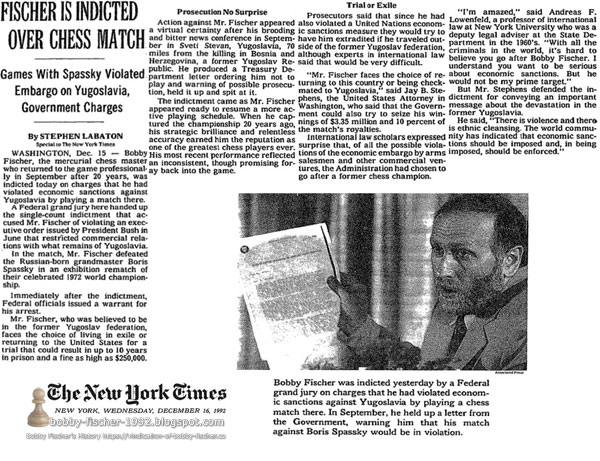New York Times, New York, New York, Wednesday, December 16, 1992 - Page 3
Fischer Is Indicted Over Chess Match
Games With Spassky Violated Embargo on Yugoslavia Government Charges
By Stephan Labaton
WASHINGTON, Dec. 15 — Bobby Fischer, the mercurial chess master who returned to the game professionally in September after 20 years, was indicted today on charges that he had violated economic sanctions against Yugoslavia by playing a match there.
A Federal grand jury here handed up the single-count indictment that accused Mr. Fischer of violating an executive order issued by President Bush in June that restricted commercial relations with what remains of Yugoslavia.
In the match, Mr. Fischer defeated the Russian-born grandmaster Boris Spassky in an exhibition rematch of their celebrated 1972 world championship.
Immediately after the indictment, Federal officials issued a warrant for his arrest.
Mr. Fischer, who was believed to be in the former Yugoslav federation faces the choice of living in exile or returning to the United States for a trial that could result in up to 10 years in prison and a fine as high as $250,000.
Prosecution No Surprise
Action against Mr. Fischer appeared a virtual certainty after his brooding and bitter news conference in September in Sveti Stevan, Yugoslavia, 70 miles from the killing in Bosnia and Herzegovina, a former Yugoslav Republic. He produced a Treasury Department letter ordering him not to play and warning of possible prosecution, held it up and spit at it.
The indictment came as Mr. Fischer appeared ready to resume a more active playing schedule. When he captured the championship 20 years ago, his strategic brilliance and relentless accuracy earned him the reputation as one of the greatest chess players ever. His most recent performance reflected an inconsistent, though promising foray back into the game.
Trial or Exile
Prosecutors said that since he had also violated a United Nations economic sanctions measure they would try to have him extradited if he traveled outside of the former Yugoslav federation, although experts in international law said that would be very difficult.
“Mr. Fischer faces the choice or returning to this country or being checkmated to Yugoslavia,” said Jay B. Stephens, the United States Attorney in Washington, who said that the Government could also try to seize his winnings of $3.35 million and 10 percent of the match's royalties.
International law scholars expressed surprise that, of all the possible violations of the economic embargo by arms salesmen and other commercial ventures, the Administration had chosen to go after a former chess champion.
“I'm amazed,” said Andreas F. Lowenfeld, a professor of international law at New York University who was a deputy legal adviser at the State Department in the 1960's. “With all the criminals in the world, it's hard to believe you go after Bobby Fischer. I understand you want to be serious about economic sanctions. But he would not be my prime target.”
But Mr. Stephens defended the indictment for conveying an important message about the devastation in the former Yugoslavia.
He said, “There is violence and there is ethnic cleansing. The world community has indicated that economic sanctions should be imposed and, in being imposed, should be enforced.”























